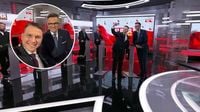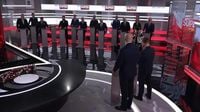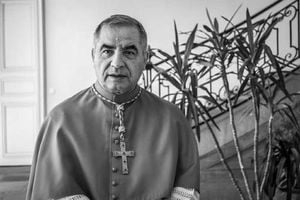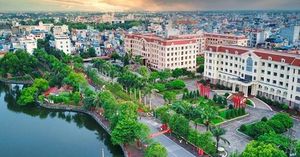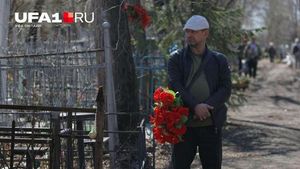During a highly anticipated presidential debate organized by Super Express on April 28, 2025, tensions flared as candidates faced off in a format that allowed them to question each other directly. The debate, which lasted over two and a half hours, featured all thirteen candidates vying for the presidency, including Sławomir Mentzen, leader of the Konfederacja party, and Szymon Hołownia, a prominent opposition figure.
As the debate unfolded, it took a surprising turn when Mentzen, in a bold move, took a selfie with Hołownia while the latter was preparing to ask a question. This moment was not just a lighthearted gesture; it was a calculated political provocation. Mentzen's selfie referenced a recent controversy involving Hołownia, who had faced backlash for allegedly taking photos during Pope Francis' funeral. By mimicking this behavior, Mentzen aimed to highlight Hołownia's past misstep and turn it into a moment of ridicule.
The atmosphere in the studio shifted dramatically as viewers watched the exchange unfold. While Hołownia maintained his composure and even smiled for the camera, many observers noted that the tension in the room was palpable. Mentzen's action was seen by some as a brilliant act of political theater, showcasing his ability to seize the moment and provoke his opponent. Yet, others criticized it as a lack of seriousness and respect for the debate's purpose.
"If someone wants to prevent Donald Tusk from winning, they should vote for me, as I have the best chance against Rafał Trzaskowski in the second round," Mentzen argued during the debate, emphasizing his position as a viable alternative to the mainstream candidates. He claimed that a vote for him was a vote for genuine change, contrasting his vision with that of his opponents.
Hołownia, however, countered Mentzen's assertions, warning that a Mentzen presidency would lead to chaos in Poland. He pointed to Mentzen's controversial views on various social issues, including his stance on paid education and the potential abolition of social welfare programs like the 800-plus benefit. "Your government will mean chaos in the country," Hołownia stated emphatically, outlining the implications of Mentzen's policies.
The debate format allowed each candidate to pose questions to their rivals, with a total of three questions per candidate. The first two were directed at chosen opponents, while the third was determined by a random draw. This setup led to a dynamic exchange of ideas and criticisms, with candidates probing each other's past actions and future plans.
Adrian Zandberg, another candidate, took the opportunity to challenge Trzaskowski on his party's unfulfilled promises regarding public assets, asserting that the current government had failed to live up to its commitments. Trzaskowski defended his record, stating, "I am ready to work together to address important issues for all Poles."
Throughout the debate, various candidates raised pressing concerns about national issues, including immigration policies, economic reforms, and healthcare. Zandberg's questions about the treatment of public property and Braun's inquiry regarding Putin's actions highlighted the differing perspectives among the candidates.
As the debate progressed, it became clear that the candidates were not just discussing policies but also engaging in a battle for public perception. Mentzen's provocative selfie was a clear attempt to dominate the narrative and position himself as a candidate willing to challenge the status quo.
While some praised Mentzen for his audacity, others expressed concern that such tactics could undermine the seriousness of the electoral process. The debate, designed to provide voters with a clear understanding of each candidate's platform, was overshadowed by the spectacle of political drama.
Critics of Mentzen's approach argued that political provocations might alienate voters looking for substantive discussions about the future of the country. "Instead of presenting a serious vision for Poland, Mentzen seems more focused on creating soundbites and viral moments," one political analyst noted.
As the debate concluded, it was evident that the candidates had left a lasting impression on the audience, with Mentzen's selfie likely to be a talking point in the days to come. The incident encapsulated the current state of Polish politics, where image and spectacle often take precedence over policy discussions.
In the aftermath of the debate, public reactions varied widely. Some applauded Mentzen's boldness, viewing it as a clever way to engage younger voters, while others lamented the decline of serious political discourse. The debate may have been intended as a platform for candidates to articulate their visions for Poland, but it ultimately highlighted the growing trend of political theater in contemporary electoral politics.
As the election approaches, it remains to be seen how these debates will influence voter perceptions and whether candidates like Mentzen can translate their provocative antics into electoral success. With the stakes higher than ever, both candidates and voters must navigate the increasingly complex landscape of Polish politics.
